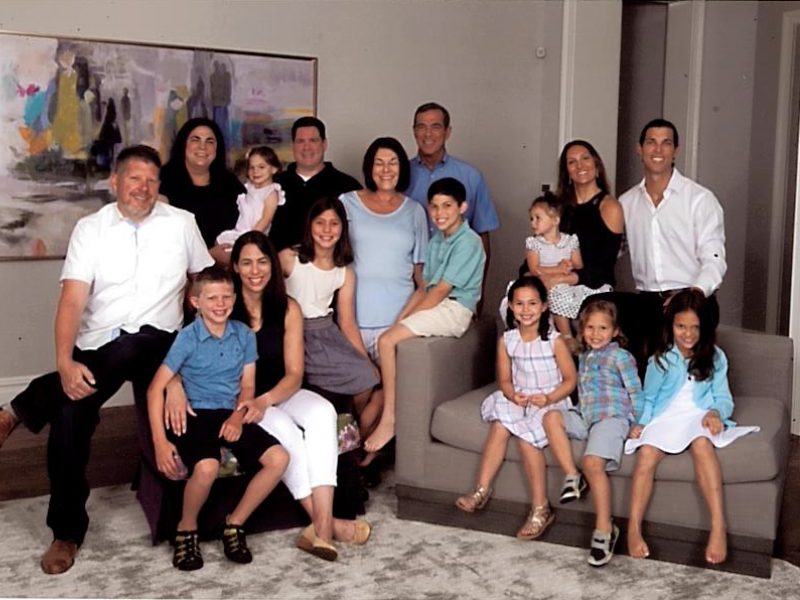David Harris

Giving Strategies: The Power of Multigenerational Philanthropy
“My father (Wilbur Cohen) and uncle (Phil Cohen) showed us kids and our children that whether you have a little or a lot, it is important to give,” said Ken Cohen. His family is the epitome of multigenerational giving with five generations making philanthropy a way of life. “From a very young age, my siblings and I learned that wealth is not what is important in life, but rather, providing for those in need.”
When families, like the Cohens, take part in a multigenerational giving strategy, genuine commitments and family values are put into action. In some families, giving is a conscious legacy; in others, it’s the subject of everyday conversations. For the Cohen family, Donor-Advised Funds (DAFs) are an easy and effective tool to put their multigenerational giving into practice. “Having a DAF makes it so easy to keep your daily financial dollars separate from charitable dollars,” said Ken. “Since the money in the DAF can only be used for charitable donations, there’s no need to cut into your budget.”
“The Federation’s DAF program is recognized and respected,” continued Ken. “They provide service with integrity and have all the features that other DAF programs in town have. The Federation is also the clearing house for all Jewish organizations in Cincinnati, and keeps account holders informed of the most urgent needs in the community.”
By providing a vehicle to set aside charitable dollars in advance, families can focus their energy on which causes are important. There are many benefits to having a DAF, including the ability to contribute stock or cash before year-end. Donors can receive a tax deduction, but there’s no pressure to make giving decisions right away. Additionally, charitable dollars can grow tax-free while donors take the time to research charities and evaluate impact.
Donor-Advised Funds also make a family’s legacy easy to carry on for generations. Family members can be named as successor advisors, meaning the original account holders can leave the balance in the fund to children or grandchildren and they can decide which causes to support in the future.
In addition, charities can also be named in a DAF succession plan. It is common for multiple generations to get together and decide what charities they will want to support in the future, based on the family’s values and legacy wishes.
“Having a DAF at the Federation makes giving so simple and so easy,” Ken noted. “All of the oversight and administration is handled by Mindy, Debra, and Jim.”
The use of DAFs for multigenerational philanthropy encourages strategic thinking about charitable giving, making the conversation the main focus. Ken and his wife, Janet, always saved change in a cookie jar as an easy and enjoyable way to engage their young grandchildren in giving. One of their favorite recipient charities was the Ronald McDonald House, and the grandkids visited the site to see the impact of their donations.
To promote multigenerational philanthropic conversations, model the engagement you would like to see. Participate in activities that allow everyone to feel the satisfaction of giving, like bringing canned goods to food pantries, taking winter coats to shelters, or even having your children or grandchildren donate some of their allowance to causes that are important to them. To stress the importance of more significant gifts and the real impact they can make, your family can do research, have discussions, and meet as a group to vote on which organizations to support.
Ken Cohen remembers his grandmother holding onto all the charitable requests sent in the mail until the end of each week to see how much they could give. She was a meticulous bookkeeper, while her husband, a 1900s Russian immigrant, worked hard to make a living as a scrap metal peddler in Middletown. They lived in an apartment their entire lives, and always made sure there was something left to help. Their generosity supported organizations in two communities—Cincinnati and Middletown.
Being philanthropic feels good and makes the world a better place, but discussing and engaging family members in giving can be one of life’s most fulfilling activities. In fact, philanthropy has a positive impact on the family unit. When family members, especially children, understand heartfelt goals of helping others, relationships have the opportunity to grow. They admire their role models, experience firsthand the impact of family giving, and in the future, continue the generosity that they have played a part in.
Giving can create, strengthen, and define family relationships. This is the power of multigenerational giving.
For more information about opening a Donor-Advised Fund, contact Mindy Garvey at mgarvey@jfedcin.org or click here to learn more.
Thanks for caring about our community and what we do.
Stay connected: sign up for our newsletter here.

